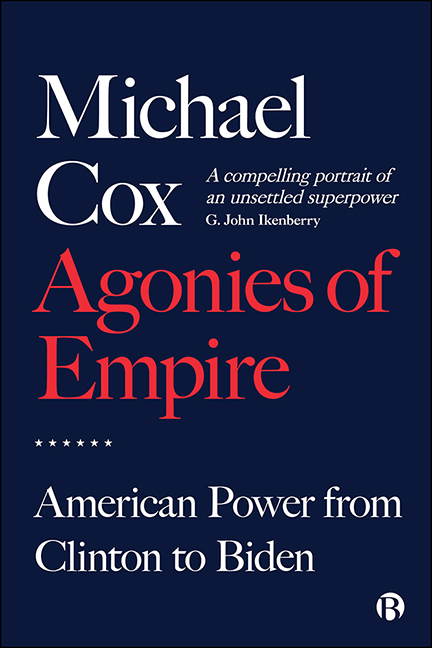Book contents
- Frontmatter
- Dedication
- Contents
- About the Author
- Preface
- Introduction: The Rise of an Empire
- PART I Clinton: Liberal Leviathan
- PART II Bush Jnr: Empire in an Age of Terror
- PART III Obama: Towards a Post-American World?
- PART IV Trump: Turbulence in the Age of Populism
- PART V Biden: Is America Back?
- Notes and References
- Acknowledgements
- Index
PART IV - Trump: Turbulence in the Age of Populism
Published online by Cambridge University Press: 15 September 2022
- Frontmatter
- Dedication
- Contents
- About the Author
- Preface
- Introduction: The Rise of an Empire
- PART I Clinton: Liberal Leviathan
- PART II Bush Jnr: Empire in an Age of Terror
- PART III Obama: Towards a Post-American World?
- PART IV Trump: Turbulence in the Age of Populism
- PART V Biden: Is America Back?
- Notes and References
- Acknowledgements
- Index
Summary
As a BBC journalist remarked not long after Donald Trump was elected:
Very few people thought he would actually run, then he did. They thought he wouldn't climb in the polls, then he did. They said he wouldn't win any primaries, then he did. They said he wouldn't win the Republican nomination, then he did. Finally, they said there was no way he could compete for, let alone win, a general election. Now he's President-elect Trump.
No doubt some then expected that he would very quickly be ‘domesticated’ and behave like any ordinary ‘decent’ Republican. Some even entertained the hope that the establishment, which included more than a few Republicans – the ‘adults in the room’ – would gradually pull him back towards the centre and that America would once again return to normal. He was, after all, a businessman and a billionaire, and thus far men like him tended to act just like businessman and billionaires had always done in the past: as upholders of the status quo. However, anybody who had studied Trump's campaign and the speeches he made when on the presidential trail should have known that he was not your average candidate. Very rich he may well have been; however, inspired in part by what had happened in the UK where the Brexiteers had scored a stunning victory over their rivals by calling on ordinary people to ‘take back control’, and in part by a group of advisers like Steve Bannon who sensed that a radical populist platform would appeal to enough Americans, Trump became the attack dog candidate of the 2016 election. And attack he did: the rich and the powerful, whom he said had benefited from globalization while working-class Americans had been losing their jobs; China, for taking advantage of a trade system that worked in its favour; European ‘free riders’ who refused to spend their own money on their own defence; immigrants, who were flooding into the country over the US–Mexican border; Muslims, who ‘hated us’; and of course, all liberals who, he claimed, controlled the media and ran the intelligence services, not to mention those bastions of political correctness – the universities.
- Type
- Chapter
- Information
- Agonies of EmpireAmerican Power from Clinton to Biden, pp. 123 - 124Publisher: Bristol University PressPrint publication year: 2022



